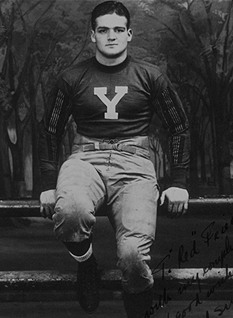Clint Frank
 Frank at Yale | |
| No. 14 | |
|---|---|
| Position | Halfback |
| Personal information | |
| Born: | September 13, 1915 St. Louis, Missouri, U.S. |
| Died: | July 7, 1992 (aged 76) Evanston, Illinois, U.S. |
| Height | 5 ft 10 in (1.78 m) |
| Weight | 190 lb (86 kg) |
| Career history | |
| College |
|
| High school | Evanston (Evanston, Illinois) |
| Career highlights and awards | |
| |
| College Football Hall of Fame (1955) | |
Clinton E. Frank (September 13, 1915 – July 7, 1992) was an American football player and advertising executive. He played as a halfback for the Yale Bulldogs, where he won both the Heisman Trophy and the Maxwell Award in 1937. In 1954, he founded the Clinton E. Frank, Inc. advertising agency.
Early life and football career
[edit]Frank attended Evanston Township High School in Evanston, Illinois, where he became known as a superb football player. He then attended Lawrenceville School as a post-graduate student.
Frank attended Yale College, where he was a member of Skull and Bones,[1] and graduated with a degree in economics in 1938. Playing for the Yale Bulldogs football team, he was a first-team selection to the All-America Teams of 1936 and 1937, the latter being a unanimous selection. As a senior, he was captain of the 1937 Bulldogs,[2] and scored three touchdowns in Yale's 19–0 victory over Brown.[3] Frank won both the Heisman Trophy and Maxwell Award for the 1937 season.[4] He beat out Byron "Whizzer" White for the Heisman Trophy; White later became a justice of the U.S. Supreme Court.
Frank was selected in the 12th round of the 1938 NFL draft by the Detroit Lions, but he did not sign and never played professional football.[5]
Frank was married to Margaret Rathje Frank, with whom he had three sons and six daughters.[3]
Military service
[edit]Clint Frank attained the rank of lieutenant colonel in the Army Air Corps, serving as an aide to General Jimmy Doolittle during World War II. Following the war he resumed his career in advertising.
Advertising career
[edit]Frank joined the Chicago advertising firm of Blackett-Sample-Hummert Inc., where he was employed for ten years before being promoted to advertising manager of E.J. Brach and Sons, the famed candy producer. Frank became a full partner in the advertising agency of Price, Robinson and Frank. He was able to transition this agency into his own with him as owner and president. In 1954 Frank established Clinton E. Frank Inc., a Chicago based advertising agency which was sold to Campbell-Ewald Co. of Detroit in 1976.[6]
Braniff Airways account
[edit]One of Clinton E. Frank Agency's most memorable clients was the flashy Dallas-based Braniff International Airways. Frank obtained the account in 1969 from famed advertising executive George Lois. The Frank Agency created the "El Clan, Braniff" advertising scheme for Braniff's growing South American Route System. They also created the highly unique Braniff "You'll Like Flying Braniff Style" Campaign. Both campaigns came complete with musical jingles which were debuted in 1971.[7]
Memberships
[edit]- Baxter Travenol Laboratories, Inc., Board Member
- Passavant Memorial Hospital, Director
- Northwestern University Hospital, Director
- Chicago Symphony Orchestra, Governing Member
- Yale Club of Chicago, Member
- American Association of Advertising, President
- Chicago Advertising Club, President
- Illinois Racing Board, Board Member
Honors
[edit]- Heisman Trophy, 1937
- Maxwell Award, 1937
- All American Quarterback and captain, two time recipient, 1937
- Good Shepherd Award from Lambs Farm[8]
Retirement and death
[edit]Frank founded the Brain Research Foundation at the University of Chicago and the Eye Research Institute in Boston. While in retirement, he founded the American Academy of Arts.
Frank died at Evanston Hospital in Evanston, Illinois after a brief illness at the age of 76.[3]
References
[edit]- ^ Wallace, William N. (2005). Yale's Ironmen: A Story of Football & Lives in the Decade of the Depression & Beyond. iUniverse. p. 157. ISBN 9780595803798.
- ^ "Year By Year Scores: 1937". Yale Football Media Guide. 1964. p. 67. Retrieved November 26, 2024 – via Internet Archive.
- ^ a b c Nidetz, Steve (July 8, 1992). "Clinton Frank, Ad Exec, Football Star". Chicago Tribune. Retrieved July 26, 2013.
- ^ http://www.star-telegram.com/2010/10/18/2550328_put-your-knowledge-of-athletes.html[dead link]
- ^ "1938 NFL Draft Listing". Pro-Football-Reference.com. Retrieved March 25, 2023.
- ^ Clinton Frank Obituary in The New York Times
- ^ "Jingle: Braniff "You'll Like Flying Braniff Style"". Fly The Branded Skies. www.brandedskies.com. Retrieved July 25, 2013.
- ^ Unsworth, Tim (1990). The Lambs of Libertyville: a working community of retarded adults. Contemporary Books. p. 189. ISBN 0809241781.


 French
French Deutsch
Deutsch